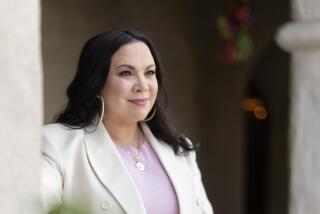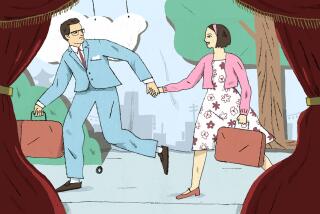Anna Deavere Smith revisits ‘Twilight: Los Angeles, 1992’
Anna Deavere Smith’s one-woman docu-play “Twilight: Los Angeles, 1992” is among the most durable artworks to emerge from the ashes of L.A.’s 1992 riots. Based on hours of interviews with about 300 people, the prismatic show was a tour de force in which Smith originally played more than 40 different characters, including then-Police Chief Daryl Gates, truck driver Reginald Denny, a former L.A. gang member and a Korean woman.
“Twilight’s” shifting points of view created moving and insightful multiple perspectives on one of the worst urban disasters in U.S. history. The play opened at the Mark Taper Forum in the spring of 1993, and went on to Broadway, where it earned a Tony Award nomination.
Smith, who’s also a college professor and actress known for her recurring role as Dr. Nancy McNally on “The West Wing,” will be back in L.A. tonight to take part in a community conversation marking the 20th anniversary of the civil disturbance that caused $1 billion in damage and left more than 50 people dead. Sponsored by the nonprofit organization Facing History and Ourselves, it will be held from 7 p.m. to 9 p.m. at Robert F. Kennedy Community High School’s Cocoanut Grove Theater at 701 S. Catalina Street.
We spoke with Smith recently about “Twilight,” her memory of the traumatic events that inspired it, and her thoughts about the state of contemporary American society. Here’s an edited transcript of the interview.
Culture Monster: What do you remember most about putting together “Twilight”?
Smith: Two things. One, the generosity of the citizens of Los Angeles, the over 300 people who spoke to me and spoke to me very openly and from the heart, and the kind of talking that all my work is about -- the kind of talking, I say, that becomes singing because it’s so deeply felt. Everyone felt so deeply from their point of view about what had happened and I interviewed such a broad range of people, from one of the Simi Valley jurists who let the cops go, to Kiki Watson [Henry Keith “Kiki” Watson], who was caught on tape involved with beating Reginald Denny, Reginald Denny himself, Daryl Gates, some of the cops, and then all kinds of people from all over Los Angeles. And so I’m very grateful to all of those people who gave me an extraordinary opportunity to try to make sense of the tale by going from great distances across the Los Angeles area to get the story. So it still holds a real place in my heart.
And then the process was very interesting. My understanding of race before that was a black and white issue, so in coming to L.A., really the world opened up.
CM: Have recent events such as the Trayvon Martin shooting in Florida led you to reflect on “Twilight” and where we are as a society compared with 1992?
Smith: I think an awful lot about my experience in L.A. as I see the events unfold around Trayvon Martin.
CM: How do you think culturally we are responding to the salient issues of our day, including race?
Smith: Well, the terrible thing right now, and I don’t know the statistics, but there’s a growing concern in some communities about how rapidly people are sent from school to jail, how quickly they’re put into the criminal justice system. And of course the rapidly growing number of brown people, both men and women, in prison. And this is terrible. You know, Thomas Jefferson wrote in the “Notes on the State of Virginia” many things that were distressing, but among them, in making a plan for public education, a plan for “discovering the excellent ones and throwing away the rubbish.” That word is really in the “Notes on the State of Virginia,” “throwing away the rubbish.” And so we have many things to thank those first creators of the Union as we know it. But this notion of ‘throwing away the rubbish,’ this way that right now with so many true stresses in our economy, many of the values that we say are so precious to us are, I think, under threat.
CM: And is our art and culture serving us well in that regard right now?
Smith: No, not as well as it could, because there’s just not enough diversity. There’s not enough diversity in the leadership and there’s not enough diversity in terms of who’s telling the stories. There’s more, but there needs to be even more, with what education costs right now and the struggle to think about what your life is going to be. I think some of our most talented people are not going to pick the arts as a way that they’re going to spend their lives.
CM: Do you think a work like “Twilight: Los Angeles” could be commissioned by a theater today?
Smith: I do absolutely think it could be commissioned today, and you know there’s some people who say I created a new form of theater, and lots of kids are working in this verbatim way here, and in England and Finland. I hear from people all over the world who are doing this type of work. So the whole idea of trying to tell the story of a community by getting the most vocal and the least vocal people to talk to you, and then put them on stage and weave these other kind of stories, with more time and consideration than a journalist can do.
ALSO:
Anna Deavere Smith revisits ‘Twilight: Los Angeles, 1992’
Sarah Jessica Parker, others join Obama arts education push
BP sponsorship of World Shakespeare Festival draws protest
More to Read
The biggest entertainment stories
Get our big stories about Hollywood, film, television, music, arts, culture and more right in your inbox as soon as they publish.
You may occasionally receive promotional content from the Los Angeles Times.







